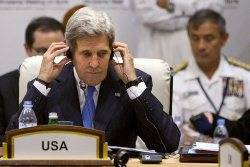Western and Arab countries have agreed to give urgent military support to Syrian opposition forces against Bashar al-Assad, and to channel that aid through a Western-backed opposition military command.
In a statement following talks in Qatar on Saturday, ministers from 11 nations in the Friends of Syria group agreed "to provide urgently all the necessary materiel and equipment to the opposition on the ground".
Their final statement also condemned "the intervention of Hezbollah militias and fighters from Iran and Iraq", demanding that they withdraw immediately from Syria.
The ministers said the growing sectarian nature of the conflict and the foreign interventions "threaten the unity of Syria [and] broaden the conflict" across the region.
James Bays, Al Jazeera's diplomatic editor, said the statement allowed members to do “as they wish” to aid the opposition forces, but also showed that there was no agreement on what that should be.
US Secretary of State John Kerry had earlier said that the group was committed to increasing aid to the opposition through the Supreme Military Council (SMC) of the Free Syrian Army, to address the imbalance of the conflict.
"The US and other countries, in their various ways - each choosing its own approach - will increase the scope and the scale of assistance to the political and military opposition. That is why we are working with our allies to coordinate our support to the Syria [National] Coalition and the Supreme Military Council."
However, he added: "We do so not to seek a military solution. Both sides should be able to compromise. Both sides should come to the table", to find a political settlement.
Al Jazeera's Basma Al Atassi, reporting from the conference, said Kerry also said that Assad had "internationalized the militarization" of the conflict by allowing Iran and its proxy Hezbollah's involvement.
The Friends of Syria group comprises Britain, France, the US, Germany, Italy, Jordan, Saudi Arabia, Qatar, the United Arab Emirates, Turkey and Egypt.
Qatar's Prime Minister Hamad bin Jassim bin Jaber Al Thani said "force may be the only way to enforce righteousness and supplying weapons to the opposition may be the only way to reach peace in Syria".
"As we know there are international and regional interventions, especially by Hezbollah, that led to bloodshed, especially in Qusayr and the same thing is being arranged in Aleppo."
Sheikh Hamad spoke later of "secret decisions about practical measures to change the situation on the ground in Syria".
He said "most countries, except for two, are agreed on how to provide assistance to the opposition forces through the military council," but did not name the two dissenting states.
Supreme Military Council commander General Salim Idriss, speaking to Al Jazeera, gave his word that weapons would go to the right people.
"I can give them any kind of guarantee they need and that the weapons and ammunition will go to the right hands, to the hands of the defected officers in the army," he said, referring to soldiers who had left regime forces to fight for the opposition.
"I am going to build technical groups to discuss in details with every country what kind of guarantees they need."
PHOTO CAPTION
U.S. Secretary of State John Kerry listens to a translation during the London 11 countries "Friends of Syria" meeting in Doha June 22, 2013.
Al-Jazeera


 Home
Home Discover Islam
Discover Islam Quran Recitations
Quran Recitations Lectures
Lectures
 Fatwa
Fatwa Articles
Articles Fiqh
Fiqh E-Books
E-Books Boys & Girls
Boys & Girls  Articles
Articles










